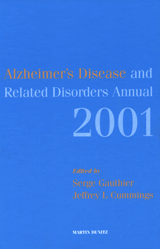Editors: Gauthier S, Cummings JL
Reviewed by: Dr. Barry Goldlist, Editor in Chief, Geriatrics & Aging.
 As is my usual practice when reviewing multi-authored textbooks, I immediately went to the list of contributors to see how representative they were of the broad community of experts. In this book, only two of the contributors are from countries other than the United States. One of these, Dr. Serge Gauthier, the eminent Canadian neuroscientist, also acts as an editor. Despite this relative imbalance, the book is excellent and of value to any physician with an interest in Alzheimer disease. Specialists and researchers will particularly enjoy the cutting-edge scientific chapters, including one on amyloid processing by Dr. Greg Cole, and Dr. Gauthier's thoughtful perspective on the past failures and future prospects of the use of muscarinic agonists in Alzheimer disease. Any physician, whether primary care provider or specialist, could benefit from the chapters on depression in dementia, the use of antipsychotic drugs in dementia and the management of late stage dementia. I was particularly impressed by the scientific rigour of the chapter on assessing competency for treatment consent capacity and financial capacity by Marson and Briggs.
As is my usual practice when reviewing multi-authored textbooks, I immediately went to the list of contributors to see how representative they were of the broad community of experts. In this book, only two of the contributors are from countries other than the United States. One of these, Dr. Serge Gauthier, the eminent Canadian neuroscientist, also acts as an editor. Despite this relative imbalance, the book is excellent and of value to any physician with an interest in Alzheimer disease. Specialists and researchers will particularly enjoy the cutting-edge scientific chapters, including one on amyloid processing by Dr. Greg Cole, and Dr. Gauthier's thoughtful perspective on the past failures and future prospects of the use of muscarinic agonists in Alzheimer disease. Any physician, whether primary care provider or specialist, could benefit from the chapters on depression in dementia, the use of antipsychotic drugs in dementia and the management of late stage dementia. I was particularly impressed by the scientific rigour of the chapter on assessing competency for treatment consent capacity and financial capacity by Marson and Briggs.
With any such text, the lag between writing the chapter and publication means that the latest information cannot always be included. The same week that I reviewed this book, for example, I read an article in the Archives of Neurology on increased B-secretase activity in the Alzheimer disease brain that potentially contradicted some of the assumptions about disease pathogenesis in the book's first chapter. Although I enjoyed Professor Schelten's scholarly review of neuroimaging in the evaluation of dementia, I am not sure there is Level 1 evidence for his assertion that one MRI examination during the course of a dementia evaluation can hardly be judged to be optional any more.
Despite these minor quibbles, this is an excellent book that can be profitably read by any physician who cares for patients with dementia, particularly of the Alzheimer type.